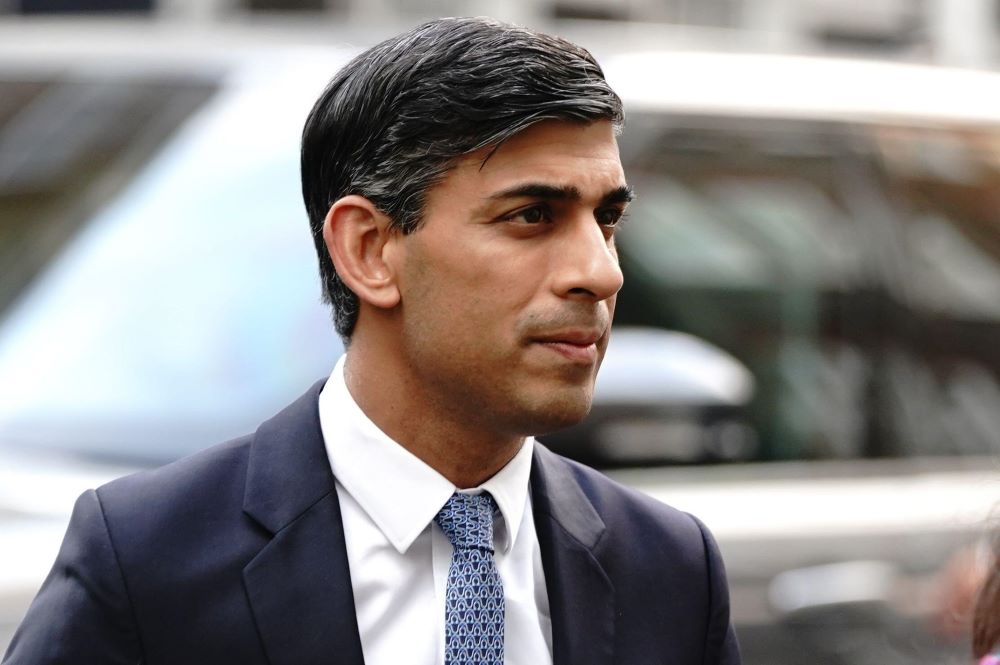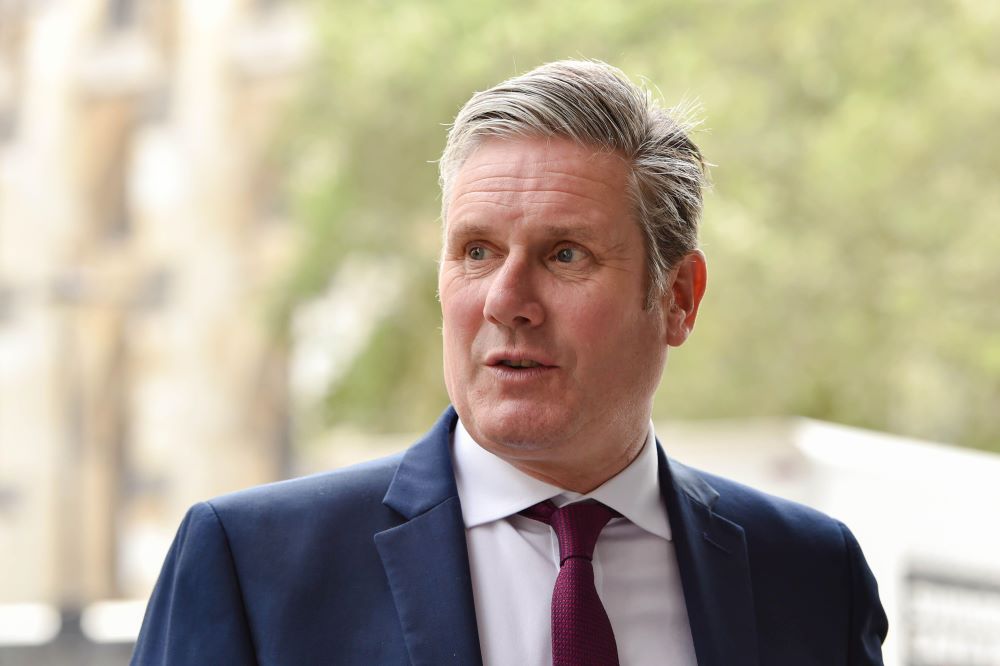Disillusioned Homeowners Aren't Confident Government Can Help Fix Mortgage Woes
Mortgages and the cost of living crisis were key themes during the focus group discussion. (Alamy)
8 min read
Homeowners have expressed renewed hopelessness over the UK's economic and political outlook after seeing their mortgage rates soar as a result of inflation-controlling measures.
PoliticsHome exclusively observed a focus group of mortgage holders in Milton Keynes on Wednesday, in the wake of the Bank of England's decision to raise interest rates to five per cent, which could see people's monthly repayments increase by hundreds of pounds, and the overall mood was grim.
Organised by More In Common, a public opinion and research consultancy, the group was made up of people with mortgages who voted Conservative in the 2019 general election on how they are feeling about the UK's current economic situation. First names only are used here to protect the identity of participants.
The 0.5 per interest rate increase is the 13th consecutive monthly rise in a bid to stifle high inflation - which has stalled for the last two months at 8.7 per cent. In a bid to show the government is trying to tackle the issue, Chancellor Jeremy Hunt held a meeting with banks last week to respond to rising rates, with banks agreeing to a 12 month grace period before evictions.
But mortgage payment rises combined and the soaring cost of living combined has left many people feeling beleaguered and exhausted – with both, along with political disillusionment, the overarching themes of the More In Common's focus group discussion.
"If it was just the mortgage, not the cost of living, then we might have escaped it – but it's a double whammy," said Guy, a photographer.
Sales manager Terri said it currently felt like "you don't get any relief from life" as mortgage rates and the cost of living continues to spiral.
"If it was one element you can you can make sacrifices - but when you've got the gas, the electricity, you've got the food, you've got the mortgage that's going to come to an end next year, you're constantly thinking: 'have I got enough to do what we would normally do?'," said Terri.
For people like small business owner Victoria, the reality of the mortgage crisis is starting to bite.
"We're currently in the process of moving and with the everything going up our biggest fear is we're going to have the same deal as last year when they start pulling mortgages," said Victoria. "Which means our first time buyer won't be able to proceed, and so we're really against the clock now."
Some people in the focus group accused prime minister Rishi Sunak of not doing enough to help people struggling with mortgage costs, as well as being too wealthy and out of touch.
Sunak, who is the wealthiest MP in parliament, appeared in the Sunday Times' Rich List last year - which showed that he and his wife Akshata Murty had an estimated net worth of £720m.
 Several people in the Milton Keynes focus group felt prime minister Rishi Sunak is too wealthy to be in touch with the public. (Alamy)
Several people in the Milton Keynes focus group felt prime minister Rishi Sunak is too wealthy to be in touch with the public. (Alamy)
June, who works at a trade union, said the government "should do more to help" and that telling people to ride out the storm with interest rates is "not good enough", especially considering Sunak's wealth.
"The Bank of England and him saying we've got to waive this thing we're going through – how can you expect people [to], people who have got no homes?" said June. "There's jobless people, there's people who are really struggling with their bills. It's alright for him - he's sitting in his multimillion pound house somewhere - and I don't think he really relates to working class people."
Victoria questioned how Sunak could "call the shots and punish us for the cost of inflation and the mortgages" when he has such an "immense disposable income".
"He's so not relatable... I'm not the only one that's infuriated by it - it's okay him saying: 'oh, we have to do this to get this', but he's never been in this situation," she said.
Writing for The House, Luke Tryl, UK director of More in Common, expressed concern about Sunak's wealth was a "common" theme to come out of focus groups.
"As has become common in our focus groups, some felt that the Prime Minister was at least competent and the ‘best of the bad bunch’," said Tryl. "But for others, his wealth means he’s not the person who can empathise enough to lead us through a cost of living crisis."
Members of the focus group did not seem to put a heavy amount of the blame at the government's, or Sunak's, door for the current economic situation – with Guy saying he believed Sunak was "doing the best of a horrible situation".
Some felt that the Prime Minister was at least competent and the ‘best of the bad bunch’
"He didn't create this situation, the cost of living crisis was there well before him," said Guy. "And if you handed the baton to anyone else, they'll be in the same shape that he is right now. So it's got nothing to do with his ability."
Last week, a YouGov poll for The Times gave Labour a 25 point lead on the Conservatives - with Labour polling at 47 per cent, and the Conservatives trailing far behind at 22 per cent.
Labour has said if it were in government forcing banks to allow borrowers to move to interest-only mortgages and extensions of repayment periods would be among measures they would consider.
However, despite their significant lead, it appears the group didn't have much faith in them either.
"I would rather support someone that has a clear plan on how to get out of the situation than someone that says: 'Oh, we can do it better, we can do it better' but they don't have a plan'," Guy said. "All [Labour] do is whinge about what they wouldn't do, rather than actually tell us what they would do."
Lawrence said the issue was more "systemic" with the UK's political system and the amount of time any government is able to spend in office.
"If a government was in for longer term, they'll have more foresight that would plan to overhead," he said. "We don't plan for generations of people we plan for the next four years."
"All [Labour] do is whinge about what they wouldn't do, rather than actually tell us what they would do."
Terri said she believed there was little the government can "physically" do to help people with mortgages because ultimately the bill for financial support to help with rising mortgages is "going to come from us".
Diana, a finance specialist, said she would like to see more support from the government she also said "at the same time I'm always thinking I don't know what they can do".
 The Milton Keynes focus group were not inspired by Labour leader Keir Starmer or his party. (Alamy)
The Milton Keynes focus group were not inspired by Labour leader Keir Starmer or his party. (Alamy)
Fran, a copywriter, said she doesn't know how the government could help given the UK's financial situation despite her own concerns about her mortgage.
"Our mortgages up in March next year, so I'm already thinking ahead thinking: Oh, my God - where am I going to get this extra money from? ..." said Fran.
"I've already talked about childcare costs... where the hell am I going to get this money from? What is it what's it going to be in in March? I don't know how they [the government] could help, though - where's the money going to come from?"
As palpable as the anxiety surrounding mortgages was a strong sense of hopelessness with the direction the country is going in. Words used by participants in the focus group to describe the UK's current state including "broken", "a joke", "expensive", and "totally mismanaged for decades".
There was little optimism among the group for the future with either of the two main political parties. While Victoria expressed unhappiness with the way the UK, she accused Labour leader Keir Starmer of having "nothing constructive to say".
"You just have to choose the lesser of the two evils, and I think by voting [Labour] just to spite the Conservatives isn't the answer, because we're just in a worse position," she said.
Whereas Fran, a copywriter who works from home, said she wouldn't be opposed to a Labour government to see "if anything good could come of it".
"I'm 34, so I was a child I think last time [Labour were in government] - so I wouldn't be opposed to it..." she said. "I don't think things could get much worse".
Reflecting on the responses, and the general sense by the focus group members that Labour could win the next election, Tryl said the "lack of enthusiasm might not matter in the short term", to ensure the party secure a "real mandate for change" Labour need to provide a more "tangible vision".
"Labour can fairly comfortably win an election by default, but the twin challenge of securing a real mandate for change in government and tackling democratic disillusionment is clearly going to require the Labour Party to offer a more tangible vision to the voters we spoke to in Milton Keynes last night," he said.
As the session ends, it's Victoria's closing comments that provide the most accurate average temperature of the mood among participants.
"It makes no difference to me," she said when asked who would win the next election, "because it's already going down the pan".
